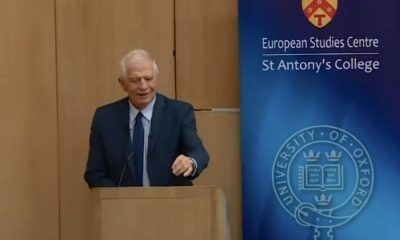Brexit
Reversió del paper: #Brexit ha exposat com la UE ha canviat la dinàmica de poder entre Gran Bretanya i Irlanda.


Owain Glyndwr looks at how Brexiteers failed to spot that the UK could no longer bully its neighbour.
Up until now, Theresa May’s government has managed to get its Brexit legislation through the British Parliament, not without difficulty but without too many problems.
What I think of as the Lessons of History (Abandonment) Bill, officially known as the European Union (Notification of Withdrawal) Bill, pretty much sailed through. It allowed the Prime Minister to trigger the Article 50 process even before she had worked out what she hoped to achieve in the two years before leaving the European Union.
The Laws of Economics (Repeal) Bill, alias the European Union (Withdrawal) Bill, was tougher going. It involved making compromises, both with those Conservative MPs who think Brexit is a potential disaster and the rather larger number who see it only as a glorious opportunity.
So, can the UK Government pull off the same trick with what I’m calling the Facts of Geography (Amendment) Order, otherwise known as the ‘meaningful vote’ on whatever deal, notably on the Irish border, is put to MPs if and when agreement is reached in Brussels?
The problem is that one of the facts of political geography really has changed. The Republic of Ireland is no longer just a small, poor country, with little choice but to fit in with Britain’s wishes.
The most obvious example of the way things used to be was when the UK finally decided to join the European Economic Community. Ireland was obliged to join as well, in order to avoid putting its trade with its neighbour at risk. In the early years of British and Irish membership, it was Ireland that fretted most about sovereignty, at a time when many of the people who had fought Britain for independence were still alive and protective of their legacy.
It was Irish, not British, politics that was challenged by the Single Market, rightly seen at the time as an extension to the entire EU of Margaret Thatcher’s political philosophy. The heroes of the 1920s had a last hurrah when the republic’s Supreme Court ruled that such a curtailment of national sovereignty required a constitutional amendment and therefore a referendum.
Approval of the Single Market was easily won, though subsequent Irish referendums wouldn’t be so easy. Ireland was a major recipient of EU aid and it made a choice that would bring economic and social transformation, eventually becoming a net contributor to the EU budget.
The adoption of the single currency was seen as a major sacrifice of sovereignty by larger countries but for Ireland it was an empowering moment. Few things remind a government of its limitations more than not being able to borrow much money in its own currency. Now Ireland’s foreign debt would be serviced and repaid in the same money as its tax receipts.
That’s a good illustration of how Ireland benefits from the economic and political strength of the wider EU but now of course we have a truly massive example before us. The power dynamic between Britain and Ireland has been reversed, with the European Union adamant that the UK must do nothing that could require customs controls or other checks on the border between Ireland and Northern Ireland.
Theresa May has explicitly accepted this obligation, even as she struggles to find a way of implementing it. It is not enough for her to avoid any British border controls, she must find a way of enabling Ireland to avoid the need for EU border controls.
This has caused anger and confusion in the ranks of the hard line Brexiteers. They are often precisely the same individuals who have always had a dismissive and patronising attitude to Ireland. During the 2016 referendum campaign in the UK, they simply refused to recognise that there was a problem.
Essentially, they adopted what has been the UK’s default setting towards its neighbour ever since the founding of the Irish Free State, to try to ignore the fact that it is actually an independent country and expect to be thanked for behaving as if it was really still part of the United Kingdom.
Irish citizens are still treated as if they were British subjects and almost certainly will still be regarded that way after Brexit. The so-called common travel area avoids the need for passport checks on the Northern Ireland border and means that there are only cursory identity checks at ports serving the ferries between Britain and Ireland.
But this is no Schengen Agreement, which is a formally concluded pooling of sovereignty. Rather than a binding international treaty, Britain and Ireland have an informal arrangement, a mutual decision not to introduce passport requirements. In so far as they thought about it at all, the Brexiteers assumed that the same approach could be extended to trade with Ireland after Britain left the EU.
They believed that a magnanimous announcement by the UK that it would not impose customs controls on goods arriving from the Republic of Ireland would be gratefully reciprocated. When they were told that would require Ireland to leave the EU too, this was seen as another ‘benefit’ of Britain’s paternalistic approach -Ireland would also reap the ‘rewards’ of Brexit.
Ireland might have traditionally been regarded as a land of myths and legends but it is giving the UK a lesson in some of the hard facts of political reality. Although some MPs are still dreaming of what a post-Brexit ‘sovereign’ parliament can do, once it’s freed from the ‘shackles’ of Brussels. Perhaps we can look forward to one of them introducing the British Weather (Sunshine Every Day) Act.
Comparteix aquest article:
-

 Política Exterior i de SeguretatFa dies 4
Política Exterior i de SeguretatFa dies 4El cap de política exterior de la UE fa una causa comuna amb el Regne Unit enmig de la confrontació mundial
-

 IranFa dies 2
IranFa dies 2Per què encara no s'ha abordat la crida del parlament de la UE per incloure l'IRGC com a organització terrorista?
-

 BrexitFa dies 2
BrexitFa dies 2Un nou pont per als joves europeus a banda i banda del Canal
-

 KyrgyzstanFa dies 3
KyrgyzstanFa dies 3L'impacte de la migració massiva russa en les tensions ètniques al Kirguizistan
























